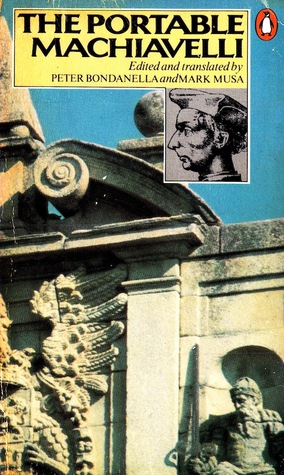صدر حديثًا
هذا الكتاب جديد وسيتم رفعه فور توفره لدينا وبعد الحصول على حقوق النشر اللازمة.

كتاب The Portable Machiavelli PDF
(0)
المؤلف:
نيكولو مكيافيليعدد القراءات:
75
اللغة:
الإنجليزية
الفئة:
علوم اجتماعيةالقسم:
الصفحات:
0
الجودة:
جيد
المشاهدات:
1020
اقتباس
مراجعة
حفظ
مشاركة
وصف الكتاب
Edited and translated by Peter Bondanella and Mark Musa, "The Portable Machiavelli" not only gives the casual reader a chance to read different personal and professional works of Machiavelli, but also strives to do away with many of the myths that have plagued the man's posthumous fame. For example, the famous "the ends justifies the means" quote is actually a gross exaggeration of what Machiavelli originally wrote, which was "in the actions of all men...when there is no impartial arbiter, one must consider the final result." The biggest counterargument Bondanella and Musa can supply is the simple fact that they include a less famous piece Machiavelli did called "The Discourses." This piece is often not mentioned or even casually footnoted because it presents the true Machiavelli - a man who was supportive of a Republic government run by the citizens. Any one who believes Machiavelli is a supporter of despots will be surprised to read him speaking in support for fair and public trials and a balance of power between rulers and their people.
"When Niccolodi Bernardo Machiavelli entered the world on May 3, 1469, his prospects were modest at best. The Machiavelli were an established middle-class family from the Oltrarno district of Florence, and its members had held an impressive number of offices in the city's govern- ment, including twelve terms as gonfaloniere, or stand-
ard-bearer, and fifty-four terms as prior. NiccolO's father, Bernardo, however, was not one of the more prosperous members of the clan, and Machiavelli could never hope to riyal the wealth or influence of the greater patrician fami- lies of Florence, such as the Ridolfi, the Rucellai, the Strozzi, or the Guicciardini. But if Bernardo's means were
insufficient to guarantee his son instant access to eco- nomic and political power, his great interest in books, particularly the Latin classics, was perhaps a more valu- able legacy. We know that he possessed a copy of Flavio Biondo's Decades. that he borrowed a copy of Justin's history, and that he obtained a prized copy of Livy's his- tory of republican Rome in return for laboriously compil- ing for the printer an index of Livy's place-names."
نيكولو مكيافيلي
كان نيكولو دي برناردو دي مكيافيلي (الإيطالي 3 مايو 1469 - 21 يونيو 1527) ، الذي تم تقديمه أحيانًا باللغة الإنجليزية باسم نيكولاس مكيافيل ، دبلوماسيًا ومؤلفًا وفيلسوفًا ومؤرخًا إيطاليًا عاش خلال عصر النهضة. اشتهر بأطروحته السياسية The Prince (Il Principe) التي كتبها حوالي عام 1513 ولكن لم تُنشر حتى عام 1532 ، وغالبًا ما كان يُدعى أبو الفلسفة السياسية الحديثة والعلوم السياسية. جمهورية فلورنسا مع مسؤوليات في الشؤون الدبلوماسية والعسكرية. كتب الكوميديا وأغاني الكرنفال والشعر. تعتبر مراسلاته الشخصية مهمة أيضًا للمؤرخين والباحثين في مجال المراسلات الإيطالية ، فقد عمل كسكرتير للقسم الثاني لجمهورية فلورنسا من عام 1498 إلى عام 1512 ، عندما خرج آل ميديتشي عن السلطة. أشهر نصائحه في عمله ، الأمير ، زعم أن تجربته وقراءته للتاريخ أظهرت له أن السياسة لطالما لعبت بالخداع والغدر والجريمة ، كما قال بشكل خاص إن الحاكم الذي يؤسس مملكة أو جمهورية ، وينتقد على أفعاله ، بما في ذلك العنف ، يجب أن يُعفى عندما تكون النية والنتيجة مفيدة له. كان أمير ماكيافيلي محاطًا بالجدل منذ إطلاقه. اعتبره البعض وصفًا مباشرًا للوسائل الشريرة التي يستخدمها الحكام السيئون. قرأ الكثيرون فيه توصيات شريرة للطغاة لمساعدتهم في الحفاظ على سلطتهم. وحتى في الآونة الأخيرة ، أعاد بعض العلماء ، مثل ليو شتراوس ، التأكيد على الرأي التقليدي القائل بأن ميكافيلي كان "معلمًا للشر". غالبًا ما يشير المصطلح مكيافيلي إلى الخداع السياسي والخداع والسياسة الواقعية. على الرغم من أن مكيافيلي قد اشتهر بعمله في الإمارات ، إلا أن العلماء يولون اهتمامًا أيضًا للنصائح الواردة في أعماله الأخرى في الفلسفة السياسية. على الرغم من أن الخطابات حول ليفي (مؤلفة 1517) أقل شهرة بكثير من الأمير ، فقد قيل إنها مهدت الطريق للجمهورية الحديثة ، كما أثرت بشكل كبير على المؤلفين الذين حاولوا إحياء الجمهورية الكلاسيكية ، بما في ذلك حنة أرندت.
الكتاب غير متاح حاليًا
هذا الكتاب غير متاح حاليًا للنشر. لقد حصلنا عليه من بموجب ترخيص المشاع الإبداعي، ولكن المؤلف أو دار النشر لم يمنحا الإذن بنشره.
قيم الآن
5 نجوم
4 نجوم
3 نجوم
2 نجوم
1 نجوم
اقتباسات The Portable Machiavelli
الأعلى تقييماً
الأحدث
اقتباس
كن أول من يترك اقتباسًا واكسب 10 نقاط
بدلاً من 3
التعليقات
كن أول من يترك تعليقًا واكسب 5 نقاط
بدلاً من 3